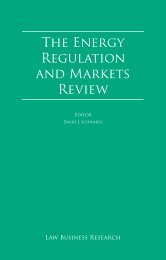U.S. Private Equity and VC Investments in Canada - Stikeman Elliott
U.S. Private Equity and VC Investments in Canada - Stikeman Elliott
U.S. Private Equity and VC Investments in Canada - Stikeman Elliott
You also want an ePaper? Increase the reach of your titles
YUMPU automatically turns print PDFs into web optimized ePapers that Google loves.
circumstances (the CBCA be<strong>in</strong>g broader than the OBCA). For<br />
example, whether or not it otherwise carries vot<strong>in</strong>g rights, each share<br />
of a CBCA corporation has a statutory right to vote <strong>in</strong> respect of a<br />
number of events, <strong>in</strong>clud<strong>in</strong>g (among others) a long-form<br />
amalgamation, “export” (cont<strong>in</strong>uance) to another jurisdiction <strong>and</strong><br />
the sale, lease or exchange of all or substantially all of the<br />
corporation’s property. In addition, both the CBCA <strong>and</strong> the OBCA<br />
also provide for class or series votes <strong>in</strong> certa<strong>in</strong> circumstances.<br />
Election of Directors<br />
Holders of preferred shares or of a particular class or series of<br />
preferred shares often negotiate the right to elect a specified<br />
number of directors to the board of directors. Alternatively,<br />
<strong>in</strong>vestors sometimes simply provide for a separate class or series<br />
vote of preferred shareholders with respect to the election of<br />
directors. In <strong>Canada</strong>, this type of provision is usually found <strong>in</strong> a<br />
Unanimous Shareholder Agreement (see pages 17-19), rather than<br />
<strong>in</strong> the articles. However, “nom<strong>in</strong>ee” directors <strong>in</strong> <strong>Canada</strong> are bound<br />
by the basic duty – applicable to all directors – of act<strong>in</strong>g <strong>in</strong> the best<br />
<strong>in</strong>terests of the corporation as a whole. This is so even where that<br />
<strong>in</strong>terest diverges from the <strong>in</strong>terest of those who nom<strong>in</strong>ated the<br />
director. Directors’ obligations are discussed below at pages 19-21.<br />
It should also be noted that a number of Canadian corporate statutes<br />
have residency restrictions on directors – for example, the CBCA<br />
requires that at least 25% of the members of a board be resident<br />
Canadians <strong>and</strong> the OBCA that resident Canadians comprise a majority<br />
of the board (or, one of two <strong>in</strong> the case of an Ontario corporation with<br />
only two directors). Notable exceptions <strong>in</strong>clude the New Brunswick<br />
Bus<strong>in</strong>ess Corporations Act (NBBCA) – a CBCA-type statute – <strong>and</strong> the<br />
Nova Scotia Companies Act (NSCA), which is based on the English<br />
“memor<strong>and</strong>um <strong>and</strong> articles of association” model. OBCA <strong>and</strong> CBCA<br />
corporations are often “cont<strong>in</strong>ued” under the NBBCA or NSCA where<br />
Canadian director requirements become an issue. “Cont<strong>in</strong>uance” is<br />
generally a simple, quick <strong>and</strong> tax-neutral transaction.<br />
Other director residency restrictions exist with respect to certa<strong>in</strong><br />
regulated <strong>in</strong>dustries. For example, the federal Telecommunications<br />
Act requires that at least 80% of the directors of a common carrier<br />
must be resident Canadians.<br />
STIKEMAN ELLIOTT LLP: U.S. PRIVATE EQUITY AND <strong>VC</strong> INVESTMENTS IN CANADA<br />
9
















